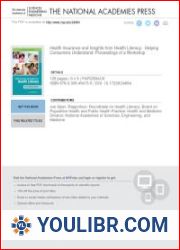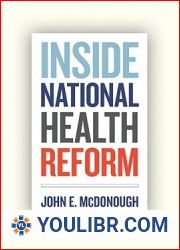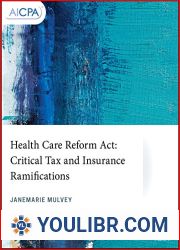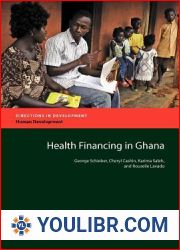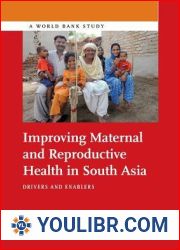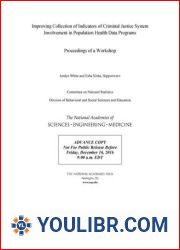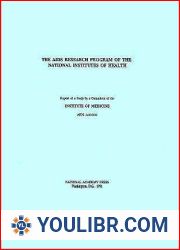
BOOKS - Ghana National Health Insurance Scheme: Improving Financial Sustainability Ba...

Ghana National Health Insurance Scheme: Improving Financial Sustainability Based on Expenditure Review (World Bank Studies)
Author: Huihui Wang
Year: August 14, 2017
Format: PDF
File size: PDF 5.8 MB
Language: English

Year: August 14, 2017
Format: PDF
File size: PDF 5.8 MB
Language: English

The book "Ghana National Health Insurance Scheme: Improving Financial Sustainability Based on Expenditure Review" presents an in-depth analysis of the Ghana National Health Insurance Scheme (NHIS) and its financial sustainability, specifically focusing on health sector expenditure and NHIS claims expenditure. The study aims to provide policy recommendations to improve efficiency and financial sustainability within the scheme. The NHIS was established in 2003 with the goal of achieving universal health coverage, and the government has earmarked value-added tax and deductions from Social Security Trust (SSNIT) to finance the scheme. However, the scheme has been running under deficit since 2009 due to expansion of coverage, increase in service use, and surge in expenditure. To address this gap, the Ghana National Health Insurance Authority (NHIA) has resorted to reducing investments, borrowing loans, and delaying claims reimbursement to providers. The study begins with an overview of the health sector expenditure and then zooms in on NHIS claims expenditure in the Volta region as a representative sample for the scheme. It identifies factors affecting the level and efficiency of expenditure, including distribution patterns that are closely related to NHIS design features. For instance, year-round open registration and fee-for-service provider mechanisms have led to adverse selection during enrollment, incentivizing oversupply but not better quality or cost-effectiveness. Additionally, the lack of patient cost-sharing and zero patient cost-sharing have reduced prudence in seeking care, causing overuse.
В книге «Национальная система медицинского страхования Ганы: Повышение финансовой устойчивости на основе обзора расходов» представлен углубленный анализ Национальной системы медицинского страхования Ганы (NHIS) и ее финансовой устойчивости, в частности, с акцентом на расходы сектора здравоохранения и расходы по претензиям NHIS. Целью исследования является предоставление политических рекомендаций для повышения эффективности и финансовой устойчивости в рамках схемы. NHIS была создана в 2003 году с целью достижения всеобщего охвата услугами здравоохранения, и правительство выделило целевой налог на добавленную стоимость и вычеты из Фонда социального обеспечения (SSNIT) для финансирования этой схемы. Тем не менее, схема работает с дефицитом с 2009 года из-за расширения охвата, увеличения использования услуг и роста расходов. Чтобы устранить этот пробел, Национальное управление медицинского страхования Ганы (NHIA) прибегло к сокращению инвестиций, заимствованию кредитов и задержке возмещения расходов поставщикам. Исследование начинается с обзора расходов сектора здравоохранения, а затем увеличивается на расходы по претензиям NHIS в регионе Volta в качестве репрезентативной выборки для схемы. Он определяет факторы, влияющие на уровень и эффективность расходов, включая схемы распределения, которые тесно связаны с особенностями проектирования NHIS. Например, круглогодичная открытая регистрация и механизмы оплаты за услуги привели к неблагоприятному отбору во время регистрации, стимулируя избыток предложения, но не улучшая качество или экономическую эффективность. Кроме того, отсутствие распределения расходов между пациентами и нулевое распределение расходов между пациентами снизили осмотрительность при обращении за медицинской помощью, что привело к чрезмерному использованию.
livre « The National Health Insurance System of Ghana : Rehausser la viabilité financière grâce à un examen des dépenses » présente une analyse approfondie du National Health Insurance System of Ghana (NHIS) et de sa viabilité financière, en particulier en ce qui concerne les dépenses du secteur de la santé et les coûts liés aux demandes d'indemnisation du NHIS. L'objectif de l'étude est de fournir des conseils stratégiques pour améliorer l'efficacité et la viabilité financière du régime. NHIS a été créé en 2003 dans le but d'atteindre la couverture sanitaire universelle, et le gouvernement a alloué une taxe sur la valeur ajoutée et des déductions ciblées au Fonds de sécurité sociale (SSNIT) pour financer ce régime. Toutefois, le régime est déficitaire depuis 2009 en raison de l'élargissement de la couverture, de l'utilisation accrue des services et de l'augmentation des dépenses. Pour combler cette lacune, la National Health Insurance Administration du Ghana (NHIA) a eu recours à la réduction des investissements, à l'emprunt et au remboursement tardif des fournisseurs. L'étude commence par un examen des coûts du secteur des soins de santé, puis augmente en fonction des coûts des demandes d'indemnisation du NHIS dans la région de Volta en tant qu'échantillon représentatif du régime. Il identifie les facteurs qui influent sur le niveau et l'efficacité des dépenses, y compris les schémas d'allocation, qui sont étroitement liés aux caractéristiques de conception du NHIS. Par exemple, l'inscription ouverte tout au long de l'année et les mécanismes de paiement des services ont donné lieu à une sélection défavorable au moment de l'inscription, stimulant l'offre excédentaire, mais sans améliorer la qualité ou la rentabilité. De plus, le manque de répartition des coûts entre les patients et la répartition nulle des coûts entre les patients ont réduit la prudence dans la demande de soins, ce qui a entraîné une utilisation excessive.
«stema Nacional de Seguro de Salud de Ghana: Aumento de la Sostenibilidad Financiera sobre la Base de la Revisión de Costos» presenta un análisis a fondo del stema Nacional de Seguro de Salud de Ghana (NHIS) y su sostenibilidad financiera, en particular, con énfasis en los costos del sector de la salud y los costos de las reclamaciones del NHIS. objetivo del estudio es proporcionar recomendaciones de política para mejorar la eficiencia y la sostenibilidad financiera dentro del esquema. NHIS se creó en 2003 con el objetivo de lograr la cobertura sanitaria universal y el Gobierno destinó un impuesto específico al valor añadido y deducciones del Fondo de Seguridad Social (SSNIT) para financiar el plan. n embargo, el esquema opera con déficit desde 2009 debido a la expansión de la cobertura, el mayor uso de los servicios y el aumento de los costos. Para colmar esta laguna, la Administración Nacional de Seguros de Salud de Ghana (NHIA) ha recurrido a la reducción de inversiones, préstamos prestados y retrasos en el reembolso a proveedores. estudio comienza con una revisión de los gastos del sector salud y luego aumenta los costos de los reclamos del NHIS en la región de Volta como muestra representativa del esquema. Identifica los factores que influyen en el nivel y la eficiencia de los costos, incluidos los esquemas de asignación, que están estrechamente relacionados con las características del diseño del NHIS. Por ejemplo, el registro abierto durante todo el año y los mecanismos de pago por servicios han dado lugar a una selección desfavorable durante el registro, estimulando el exceso de oferta pero sin mejorar la calidad ni la rentabilidad. Además, la falta de distribución de los gastos entre los pacientes y la nula distribución de los gastos entre los pacientes han reducido la prudencia a la hora de buscar atención médica, lo que ha provocado un uso excesivo.
Il stema Nazionale di Assicurazione Sanitaria del Ghana: Migliorare la sostenibilità finanziaria sulla base della revisione dei costi fornisce un'analisi approfondita del stema Nazionale di Assicurazione Sanitaria del Ghana (NHIS) e della sua sostenibilità finanziaria, con particolare riferimento ai costi del settore sanitario e alle spese sostenute dal NHIS. L'obiettivo della ricerca è fornire raccomandazioni politiche per migliorare l'efficienza e la sostenibilità finanziaria nel quadro del piano. La NHIS è stata creata nel 2003 per raggiungere la copertura sanitaria universale, e il governo ha assegnato una tassa mirata sul valore aggiunto e le detrazioni dal Fondo di previdenza sociale (SSNIT) per finanziare lo schema. Tuttavia, lo schema funziona con deficit dal 2009 a causa di maggiore copertura, maggiore utilizzo dei servizi e aumento della spesa. Per colmare questa lacuna, l'Agenzia Nazionale di Assicurazione Sanitaria del Ghana (NHIA) ha fatto ricorso alla riduzione degli investimenti, all'indebitamento e al ritardo dei rimborsi ai fornitori. Lo studio inizia con una panoramica dei costi del settore sanitario, e poi aumenta per i costi delle rivendicazioni NHIS nella regione Volta come modello rappresentativo per lo schema. Identifica i fattori che influenzano il livello e l'efficienza dei costi, inclusi gli schemi di distribuzione, strettamente correlati alle caratteristiche della progettazione NHIS. Ad esempio, la registrazione aperta di tutto l'anno e i meccanismi di pagamento dei servizi hanno portato a una selezione sfavorevole durante la registrazione, incentivando l'eccesso di offerta, ma senza migliorare la qualità o l'efficienza economica. Inoltre, la mancata ripartizione dei costi tra i pazienti e lo zero dei costi tra i pazienti hanno ridotto la discrezione nel chiedere assistenza medica, che ha portato a un uso eccessivo.
Das Buch „Ghana's National Health Insurance System: Improving Financial Resilience Based on a Expenditure Review“ bietet eine eingehende Analyse des Ghana's National Health Insurance System (NHIS) und seiner finanziellen Nachhaltigkeit, insbesondere mit Schwerpunkt auf Ausgaben des Gesundheitssektors und NHIS-Schadenskosten. Ziel der Studie ist es, politische Empfehlungen zur Verbesserung der Effizienz und der finanziellen Nachhaltigkeit des Programms zu geben. NHIS wurde 2003 mit dem Ziel gegründet, eine allgemeine Gesundheitsversorgung zu erreichen, und die Regierung hat eine gezielte Mehrwertsteuer und Abzüge aus dem Sozialversicherungsfonds (SSNIT) zur Finanzierung des Systems vorgesehen. Die Regelung ist jedoch seit 2009 defizitär, was auf eine Ausweitung der Abdeckung, eine verstärkte Inanspruchnahme von Dienstleistungen und steigende Kosten zurückzuführen ist. Um diese Lücke zu schließen, hat die Ghana National Health Insurance Administration (NHIA) darauf zurückgegriffen, Investitionen zu reduzieren, Kredite aufzunehmen und die Erstattung der Kosten an die Anbieter zu verzögern. Die Studie beginnt mit einem Überblick über die Ausgaben des Gesundheitssektors und erhöht sich dann um die Kosten für NHIS-Anträge in der Volta-Region als repräsentative Stichprobe für das Programm. Es identifiziert die Faktoren, die die Höhe und Effizienz der Ausgaben beeinflussen, einschließlich der Verteilungsmuster, die eng mit den Konstruktionsmerkmalen des NHIS zusammenhängen. Zum Beispiel führten die ganzjährige offene Registrierung und die Zahlungsmechanismen für Dienstleistungen zu einer ungünstigen Auswahl bei der Registrierung, was zu einem Überangebot führte, ohne jedoch die Qualität oder die Kosteneffizienz zu verbessern. Darüber hinaus verringerte die mangelnde Kostenverteilung zwischen den Patienten und die Null-Kostenverteilung zwischen den Patienten die Diskretion bei der Suche nach medizinischer Versorgung, was zu einer Überbeanspruchung führte.
''
Gana'nın Ulusal Sağlık gortası Programı: Harcama İncelemesi yoluyla Finansal Sürdürülebilirliğin Geliştirilmesi kitabı, özellikle sağlık sektörü harcamaları ve NHIS talep harcamalarına odaklanan Gana'nın Ulusal Sağlık gortası Programı (NHIS) ve finansal sürdürülebilirliğinin derinlemesine bir analizini sunmaktadır. Çalışmanın amacı, program dahilinde verimliliği ve finansal sürdürülebilirliği artırmak için politika tavsiyesi sağlamaktır. NHIS, evrensel sağlık kapsamına ulaşmak amacıyla 2003 yılında kuruldu ve hükümet, programı finanse etmek için hedeflenen bir katma değer vergisi ve Sosyal Güvenlik Fonu İndirimi (SSNIT) ayırdı. Bununla birlikte, program, artan kapsama alanı, artan hizmet kullanımı ve artan maliyetler nedeniyle 2009'dan bu yana açık veriyor. Bu boşluğu gidermek için, Gana Ulusal Sağlık gortası Kurumu (NHIA) yatırımları azaltmaya, kredileri ödünç almaya ve geri ödemeleri geciktirmeye başvurdu. Çalışma, sağlık sektörü harcamalarının gözden geçirilmesi ile başlar ve daha sonra program için temsili bir örnek olarak Volta bölgesinde NHIS talep harcamalarına yükselir. NHIS tasarım özellikleriyle yakından ilişkili olan tahsis modelleri de dahil olmak üzere harcamaların düzeyini ve verimliliğini etkileyen faktörleri tanımlar. Örneğin, yıl boyunca açık kayıt ve hizmet ücreti mekanizmaları, kayıt sırasında olumsuz seçimle sonuçlanmış, aşırı arzı teşvik etmiş, ancak kaliteyi veya maliyet etkinliğini artırmamıştır. Ayrıca, hastalar arasında maliyet paylaşımının olmaması ve hastalar arasında sıfır maliyet paylaşımı, bakım arayışındaki ihtiyatı azaltarak aşırı kullanıma yol açmıştır.
يقدم كتاب مخطط التأمين الصحي الوطني في غانا: تحسين الاستدامة المالية من خلال مراجعة النفقات تحليلاً متعمقًا لنظام التأمين الصحي الوطني في غانا (NHIS) واستدامته المالية، مع التركيز بشكل خاص على نفقات قطاع الصحة ونفقات مطالبات NHIS. الهدف من الدراسة هو تقديم المشورة في مجال السياسات لتحسين الكفاءة والاستدامة المالية داخل المخطط. تم إنشاء NHIS في عام 2003 بهدف تحقيق التغطية الصحية الشاملة، وخصصت الحكومة ضريبة القيمة المضافة المستهدفة وخصم صندوق الضمان الاجتماعي (SSNIT) لتمويل المخطط. ومع ذلك، كان المخطط يعمل بعجز منذ عام 2009 بسبب زيادة التغطية وزيادة استخدام الخدمات وارتفاع التكاليف. لمعالجة هذه الفجوة، لجأت الهيئة الوطنية للتأمين الصحي في غانا (NHIA) إلى تقليل الاستثمار واقتراض الائتمانات وتأخير السداد لمقدمي الخدمات. تبدأ الدراسة باستعراض إنفاق القطاع الصحي ثم تزداد نفقات مطالبات NHIS في منطقة فولتا كعينة تمثيلية للمخطط. وهو يحدد العوامل التي تؤثر على مستوى الإنفاق وكفاءته، بما في ذلك أنماط التخصيص التي ترتبط ارتباطا وثيقا بخصائص تصميم نظام المعلومات الصحية الوطنية. فعلى سبيل المثال، أدت آليات التسجيل المفتوح والرسوم مقابل الخدمة على مدار السنة إلى الاختيار السلبي وقت الالتحاق بالمدارس، مما حفز زيادة العرض ولكن لم يحسن الجودة أو فعالية التكلفة. بالإضافة إلى ذلك، أدى عدم تقاسم التكاليف بين المرضى وعدم تقاسم التكاليف بين المرضى إلى تقليل الحكمة في طلب الرعاية، مما أدى إلى الإفراط في الاستخدام.














